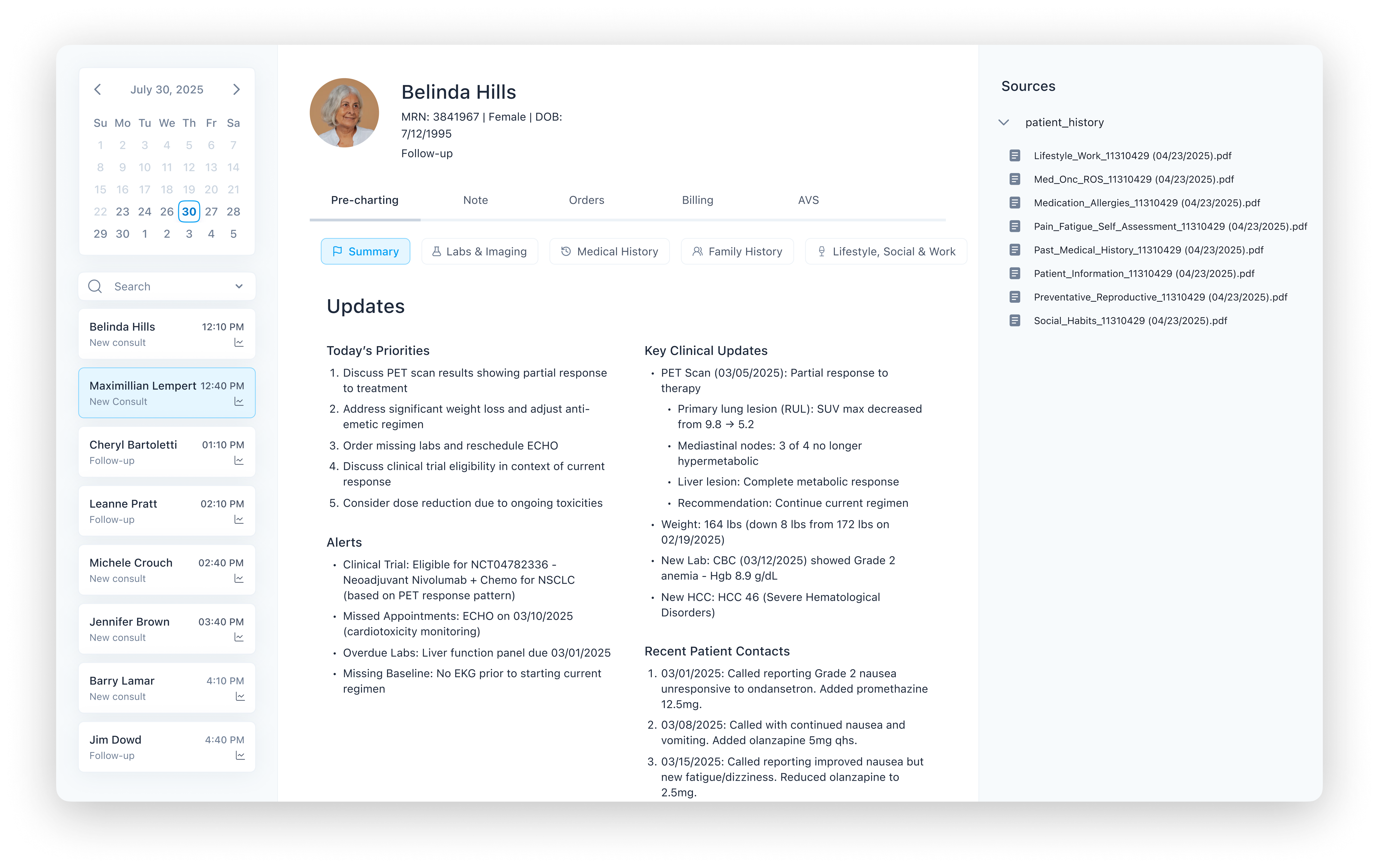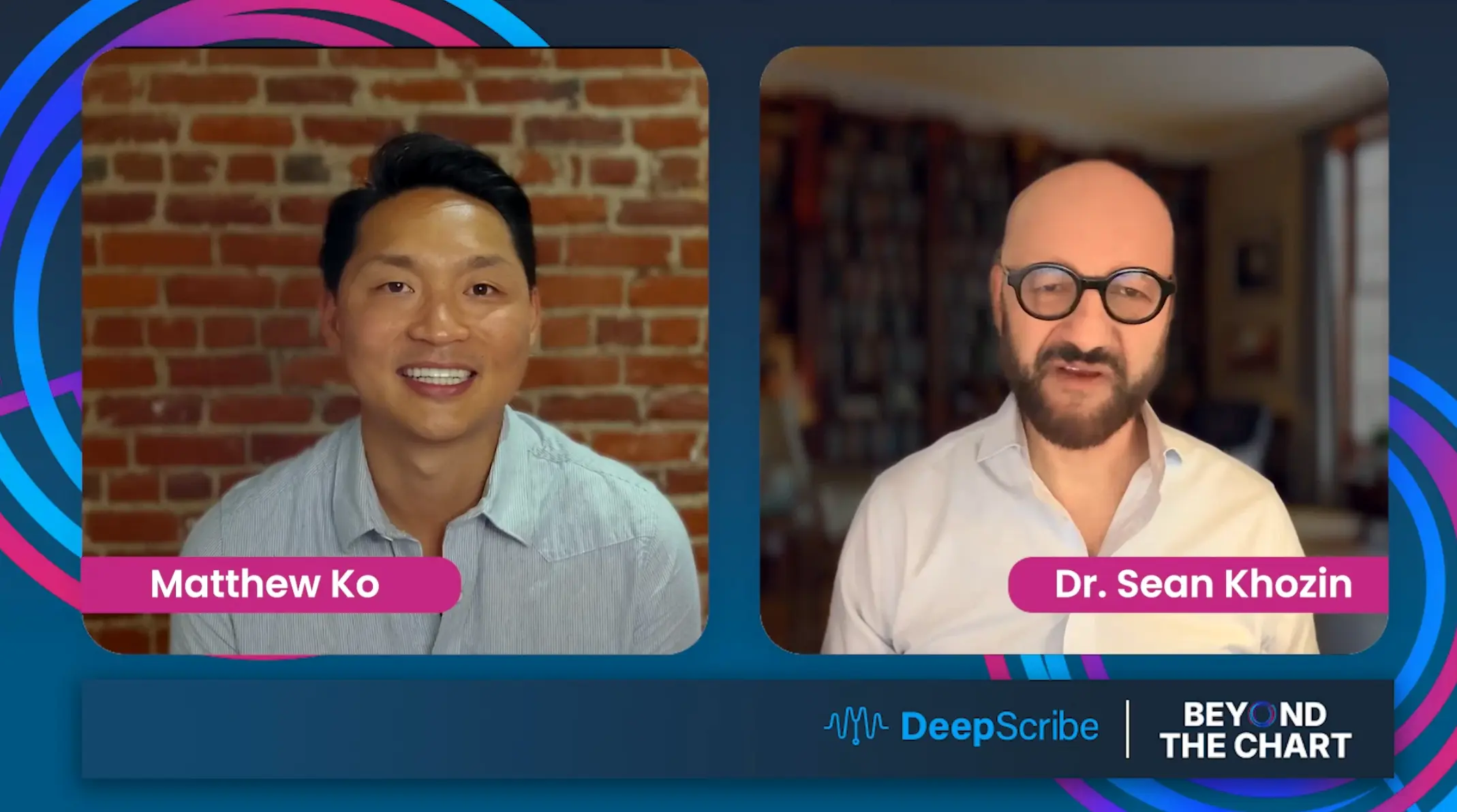The Critical Role of AI Pre-Charting in Cancer Care
AI-powered pre-charting supports oncologists with concise, contextual summaries to manage complex cancer care and enhance clinical decision-making.


The following was originally published on LinkedIn in May 2025.
By Matthew Ko, DeepScribe CEO and Co-founder
Cancer care is a complex, sophisticated interplay of detailed information and deeply personal patient narratives. Every patient's journey is a mosaic of diagnostic insights, multifaceted treatment regimens, and evolving clinical priorities.
In one of many conversations collaborating with Dr. Gury Doshi, an oncologist and medical director at Texas Oncology, she illustrated the complexity of just a single patient visit:
“We discuss symptoms, we discuss symptom management, we have to review laboratory values and radiographic images. We go over treatment plans including very difficult conversations about multiple medications in a therapy regimen. These are complex issues.”
Navigating this while preserving personalized, empathetic care is a daunting task that oncologists face daily.
Ambient AI has been a powerful ally by seamlessly documenting real-time conversations between clinicians and patients, capturing crucial moments and insights that might otherwise not make the chart. Yet there is another, less visible but equally critical dimension of high-quality cancer care, requiring diligent preparation before a clinician even begins the encounter: pre-charting.
Pre-charting: The Starting Line of Clinical Encounters
Effective pre-charting is not just an administrative process. It’s a thoughtful, deliberate review of patient charts, clinical narratives, pathology findings, lab data, imaging, and consultations, sometimes extending into external records. This is the foundation upon which successful patient care is delivered.
Unfortunately, this essential step remains heavily manual, deeply fragmented, and cognitively demanding. Precious clinical hours are spent each week sifting through scattered pieces of information – time that could be spent with patients.
Considering all the information for one cancer patient, relevance can be obscured by volume. Critical insights might be three clicks deep or lost in a PDF scan.
But better pre-charting is about more than just time. When the pre-charting process is inconsistent or inefficient, it can impact the quality of care. Considering all the information for one cancer patient, relevance can be obscured by volume. Critical insights might be three clicks deep or lost in a PDF scan.
In oncology, where each visit could mean a pivotal moment in treatment, missed signals matter.
To be clear, this isn’t a matter of not enough data. Rather, it is a matter of effective curation, timely delivery, and precise contextualization of data. Oncologists require focused, relevant summaries in the right format, at precisely the right moment – tailored explicitly to the unique demands of each upcoming patient visit.
Oncologists need pre-charting that’s concise, yes; but it must also deliver clarity that helps guide the next conversation, the next clinical decision.
DeepScribe’s Matthew Ko on how AI pre-charting works for clinicians
The Challenge of Oncology Workflows
In oncology, pre-charting requirements vary significantly based on the context of the encounter, with a considerable array of possibilities. A new patient consult, for instance, is a full clinical narrative capturing the origin of the cancer, staging evaluations, genetic and molecular analyses, previous therapies, and multidisciplinary perspectives. Capturing all this effectively sets the stage for well-informed decision-making.
Follow-up visits emphasize precision and relevance, and context is critical. Pre-charting for follow-ups requires focused updates on disease progression, comparative imaging studies, recent lab results, treatment efficacy, and evolving symptom management.
When a system delivers what the clinician needs for that visit and that moment, AI pre-charting begins to truly support oncology care.
The ability to efficiently differentiate between these scenarios is crucial and challenging, and static summaries fall short of meeting these needs. When a system delivers what the clinician needs for that visit and that moment, AI pre-charting begins to truly support oncology care.
Working with Oncologists to Synthesize Complexity
In an ongoing collaboration between DeepScribe and oncologists, we’ve created an AI-powered pre-charting solution for oncology, also applicable to other complex specialties. It synthesizes data from across disparate sources – from structured EHR fields to unstructured PDFs – to create a concise, contextual view tailored to the clinician’s and patient’s needs.
As with any useful technology, what truly makes the difference is the philosophy and guidance behind it.

AI pre-charting is the result of years of onsite observation as oncologists prepared for patients throughout their day. As they work, we watch where they pause and where their attention sharpens. We listen to their needs and thought processes. These moments reveal the actual friction points – and the real opportunities.
The insights that come from collaboration and observation lead to a dynamic AI model, one that aligns information with the current moment in the patient’s journey, whether it’s a new diagnosis, a follow-up, or post-chemotherapy care.
For each patient, clinicians can find a summarized history, relevant details and priorities, and key lab or imaging results since the last visit. In short, just what they need for the half-hour or hour to come.
Pre-Charting as a Driver of Better Care
Effective AI pre-charting fundamentally transforms the clinician experience. With difficult pre-encounter work already prepared, oncologists can greet every patient fully informed and wholly focused. This translates into deeper, more meaningful patient connections – ultimately elevating the quality and personalization of care.
For any oncologist, that’s a welcomed opportunity. In their line of medicine, the stakes are high, and the path is rarely linear.
A Future Built With Clinicians, Not Just For Them
Our obligation as technologists is to never create solutions like these in isolation. It’s to listen, translate, and co-create. This approach and action led us to understand the demands that pre-charting places on oncologists, and to do something to lighten the load.
Clinicians are not just "users". They're our co-authors.
Clinicians are not just “users”. They’re our co-authors. Every advance or improvement we make is grounded in their feedback and shaped by their needs and experiences. That’s how we ensure AI is not just fundamentally smart, but truly useful to the people it’s made for.
Final Thoughts
AI pre-charting may not be the most visible part of the cancer care journey, but it has the potential to help shape the fabric of clinical care, just as ambient documentation does: improving outcomes, streamlining workflows, and making room for a deeper connection between patient and provider.
When AI is used thoughtfully it doesn't take over the clinician's role; it sharpens it. Pre-charting is an ideal example. Oncologists step into the room with clarity and confidence, fully present for the people who need them most.
Creating tools like AI pre-charting is not just about workflow optimization; it's about a future of care where technology amplifies human connection. It’s where clinicians can make empathy and understanding focal points of the patient experience. That future is not abstract or far off. It is being built now, in collaboration with those at the front lines of care.
text
Related Stories
Realize the full potential of Healthcare AI with DeepScribe
Explore how DeepScribe’s customizable ambient AI platform can help you save time, improve patient care, and maximize revenue.




